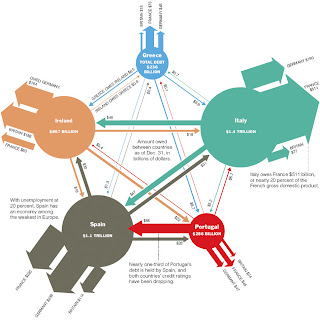Today's lecture was a bit of a deja vu moment for me. As Professor Brennan questioned why students would purchase a Starbucks beverage rather than donate $2.50 to a child in need, I was reminded of a similar discussion I had in high school. I was required to take a course called "Poverty" (the class now has the more politically correct title of "Community Service"). The class touched on many of the issues examined in "Prosperity" — inequality, how inequality arises, how it is corrected, how societies are designed and with a hint of moral compulsion, what we are responsible to do to ensure equality for all.
We read an article that I have tried to relocate (unsuccessfully) that determined what the baseline level of income necessary to live comfortably was. Let's say it was $50,000. The author stated that anyone who kept money about that amount, rather than donate it to a worthy cause, was not just neglecting the dying children of the world, but in effect, granting them a death sentence. The degree of responsibility citizens of the world hold for each other is enhanced exponentially; it is the embodiment of the drowning child analogy.
For a classroom of teenagers who have been well-taken care of up until this point in life, this can be a hard argument to stomach. Does neglecting our job as "our brother's keeper" really make us his killer? Singer writes that if there is pain and suffering in Bengal and we can do something about it, we are obligated to do so. (1) But how much does "obligation" obligate us to do? What are the limits? Or rather, what is the minimum we can do in order to sleep consciously at night knowing we have done the morally correct thing?
This question of responsibility and obligation is heart-wrenching on the level of a single child, or even when examining an entire impoverished nation, but what about so-called obligation in the developed world? For months, Greece has been falling faster and faster, and newspaper headlines have questioned endlessly what this means for the European Union. How far does responsibility go when there are existing ties? Is Germany morally bound because of a promise they made? (Let's suspend all economic realities for a quick second.)
This graphic from the New York Times illustrates the circular web of European debt and it is baffling. The arrows, pretty little graphics on my computer, represent billions and billions of dollars, circulating back-and-forth.

It's a different image than the one usually accompanying this kind of debate. (That one being the skeletal child, left to fend for itself while an animal lurks nearby.) But it illustrates responsibility of a larger scale nonetheless. Where does the obligation start, and how does it end? Do we only give to those, like big European nations, who we know will pay us back? Must a country like Germany put its own citizens in danger because of a promise it made, or is that the wrong lens with which to examine this entire debacle?
Singer, in a lengthy article, concludes by saying that we must not take ourselves — and the argument — too seriously, because morals never play out exactly as intended. So perhaps the debate is fruitless, because in the end, we will buy a Starbucks mocha latte, even though we are entitled to Ratty coffee. Perhaps Europe will circulate funds amongst its own, rather than divert them to other nations. And perhaps Europe won't — and they'll make Greece learn a lesson. The question is just where we draw our lines. And here's hoping those moral lines are made of more than just sand.
_____
(1) Singer, "Famine, Affluence and Morality"
No comments:
Post a Comment